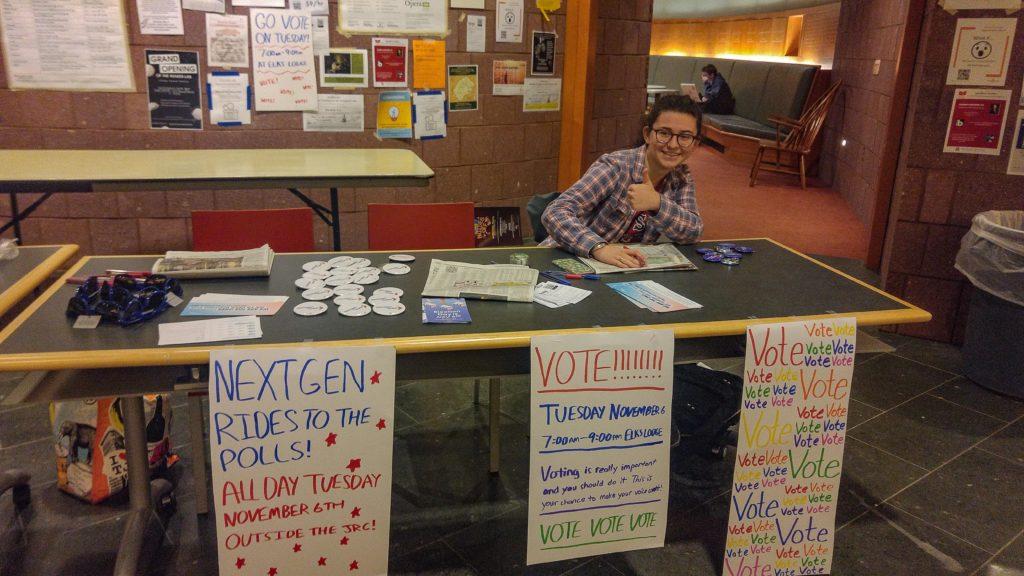Over the past few months, Grinnell College has witnessed a surge of announcements regarding voting in the Midterm Elections. The evening of Nov. 6 was no exception, as a devoted cohort of volunteers for the advocacy group NextGen America stood on the steps of the Joe Rosenfield Center (JRC) for hours with signs and megaphones, directing students to the polls. There was a unique sense of urgency as students came outside to board the shuttles, some of them going to vote for the first time in their lives.
A few weeks prior to the elections, political science professor and Rosenfield Program Director Barb Trish sent an email to all faculty members in order to encourage them to remind their students to vote. In this email, she cited statistics from the National Study of Learning, Voting, and Engagement (NSLVE), which showed that Grinnell College’s turnout, already unusually low for a college in its category, decreased in 2012 and 2016, while other schools had increased turnout between those elections.
The NSLVE study compiles turnout data from participating campuses to determine changes over time and differences between schools. According to the Grinnell-specific NSLVE report, Grinnell went from 42.8 percent turnout among all eligible voters in 2012 to only 40.7 percent in 2016, while the average turnout of all participating institutions was 4.6 percent. Grinnell’s turnout dropped from being 4.1 points below the average in 2012 to nearly 10 points below in 2016. In addition, Grinnell’s voting rate among registered students fell from 61.2 percent to 58 percent, while the registration rate itself stayed constant.
Faced with these statistics, Trish found herself with no option but to appeal to her colleagues to inspire their students.
“In the past, even as a political scientist, I wouldn’t take class time to encourage participation,” wrote Trish in an email to The S&B. “We study it, try to understand why people participate and why they don’t. We talk about methods and possible institutional changes that might facilitate higher turnout. But I’ve always stopped short of saying ‘go out and vote.’ But this time around, I thought that it’s worth a shot. And it’s worth encouraging other professors to do it too.”
Trish wrote in the email sent to professors, which she forwarded to The S&B, “Grinnell students are not exercising their right to vote. Given how important it is for their voices to be heard in the electoral process, as well as confusing changes across Iowa and the country in the laws governing voting, I ask you to spend a small amount of class time to encourage voting and to clarify the process. Recent research has shown that making an appeal in the classroom to a semi-captive audience is an effective way to promote student voter participation.”
Trish emphasized that the email was intended only to encourage professors to support their students in registering and voting, and not, as she wrote “for a particular candidate or party … this is a plug for voting wherever the student chooses to vote, whether in a home state or in Iowa.”
Trish’s email was not the only method in which students received encouragement to vote. Over the past several months, NextGen and student volunteers had hosted events and tabled to help students register to vote, as well as provide students with information on their voting location and requirements.
In an email to The S&B, Grinnell College housing coordinator Lauren Myers wrote, “As an institution, we have made a concerted effort this election to emphasize the power and importance of student voices in the political sphere. I think students can sometimes underestimate their ability to effect change, and we want to empower them to exercise their right to vote and facilitate that process in any way we can.”
According to Myers, the encouragement made an impact. She expressed hope that students are beginning to gain more interest in voting, as well as the political issues that affect them.
“I have noticed a significant increase in the number of students who have reached out to me, both to provide proof of residence documents in order to register but also to ask more general questions about the electoral process,” she wrote. “I think students are more aware this election of how impactful they are as a population, and how integral their participation is in bringing about change at federal, state, and local levels.”
Trish also felt hopeful going into the midterm elections that students would exercise their right to vote.
“I hope it prompts everyone – students, faculty/staff/administrators – to try to figure why it’s been low in the past and what can be done to facilitate engagement in the future,” she wrote. “It’s not as if students and others haven’t tried hard in the past to encourage participation. And not to take anything away from the groups mobilizing this year – because it looks they were creative and very effective – but there did seem to be a receptivity to the idea of participating that had been absent in some recent election cycles.”


































































